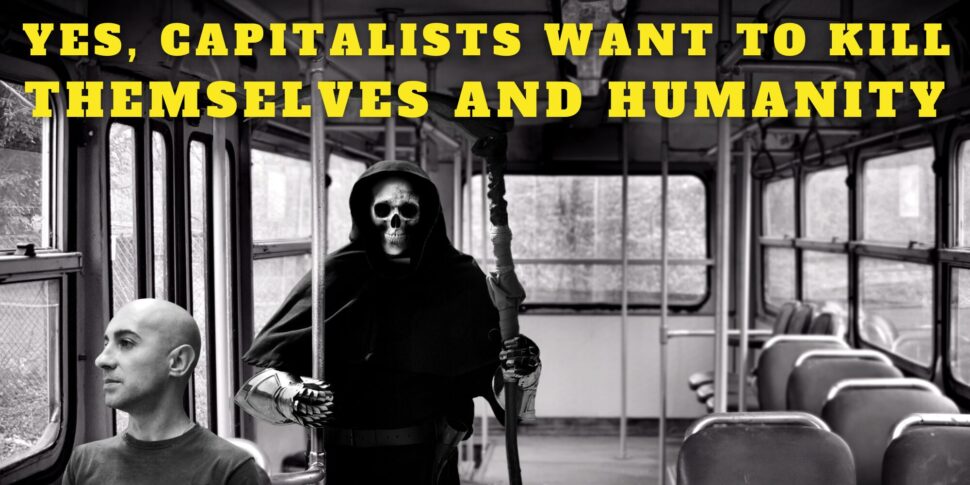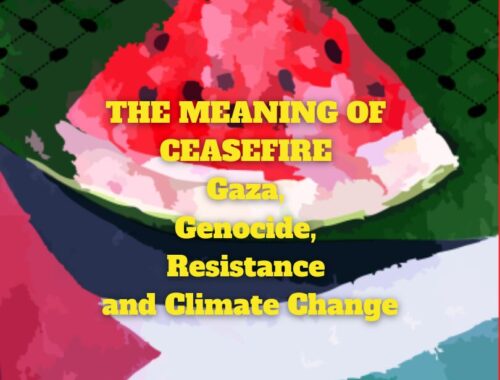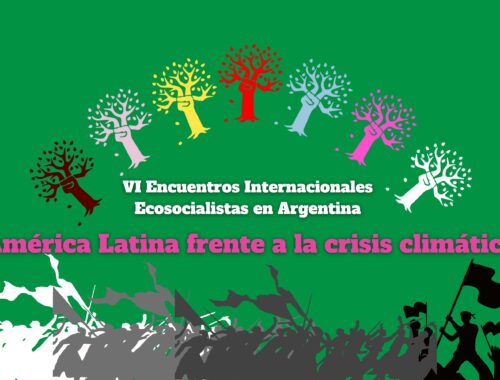
Yes, capitalists want to kill themselves and Humanity
BY JOÃO CAMARGO
There’s a complicated question we can’t run away from anymore. Do the elites of capitalism want to die?
If they know the origin and consequences of the climate crisis and don’t solve it, aren’t they actively destroying the material foundations – a stable global climate, predictability in terms of soil and water for agriculture, availability of water and habitability of territories where hundreds of millions of people live. Aren’t they digging their own grave?
The answer is yes. The political and economic elites of capitalism are pushing us (and themselves) towards collapse. To ours and their catastrophe.
There are those who answer no and go on to explain that they have an extra plan, which we don’t know about. They use this argument to put themselves in one of two comfortable positions:
– Saying (and believing?) there is no climate change.
– Saying (and believing?) there is a solution that is yet to appear.
Another issue is also raised: they’re not planning on dying, as they have huge plans to profit from the climate crisis.
Both answers are true. They’re not planning on dying, and they have, as they always do, plans to profit off of everything.
I’ve struggled with this question ever since I realized that climate change existed, almost 20 years ago. I was initially paralyzed by the lack of an answer.
For a long time I watched what was happening, hoping I was wrong. Maybe there was no climate change, maybe someone was working it out in the shadows.
Many were making money, as always. I watched the unstoppable rise in emissions, accompanying the now dizzying rise in temperature, the institutional process of the COPs, the Kyoto protocol, the Paris Agreement, the repetitive talk of technology that was going to but never did solve the growing emissions. The fact that I didn’t have the answers didn’t mean the questions weren’t right.
How is it that such an articulated global system, with so many resources at its disposal, pushes its foundations – humanity, water, soil, natural resources – towards collapse? It’s counterintuitive, irrational. Nevertheless, it is what is happening.
The main explanation for this is usually attributed to the inertia of the capitalist system, a machine so colossal and total that it has made all social, political and economic principles conform to its rules. That’s why the board or the management of a company that doesn’t grow and expand (or grow and expand more than its rivals) is pushed out . It is the reason why a country that doesn’t colonize or intensify the exploitation of its people or resources sees its governance harassed or removed. That is why every aspect of our social and private lives is being commodified or is already a commodity.
To this I would now add another explanation: the alienation of the elites under capitalism. I take this idea from the work of Antonio Gramsci. To understand, I need to explain Gramsi’s ideas about ideology.
Antonio Gramsci was an Italian communist organiser and unparalleled thinker. He wrote down his ideas while he was a political prisoner in Mussolini’s Italy in the 1920s and 30s. Gramsci challenged two dominant ideas of his time: epiphenomenalism and class reductionism. Shortly, epiphenomenalism was a theory about physical and mental realities, advocating that mental states (such as ideas and ideology) were completely dependent on physical states, that is, that only material conditions determine ideology.
Gramsci questioned the direct correlation between ideological superstructure and economic infrastructure, previously (and subsequently) assumed almost as a ‘natural law’. Gramsci denied the idea that capitalist society would inevitably collapse as a result of its own economic laws and contradictions that lead to pauperisation of the working glass and to environmental collapse. The question of consent as a part of power, rather than pure coercion by the class in power was central, as it lead to the question of hegemony in society.

Gramsci divided the “integral state” into two spheres. One was Political Society: the coercive apparatus to conform the masses according to the type of production and economy at any given moment. The other was Civil Society: the hegemony of a social group over the entirety of society exercised through private organisations like- the church, the unions and the schools.
Refusing class reductionism in ideology, Gramsci denied that there were pure class ideologies, he defined ideology as a set of practices, principles, and dogmas with a material and institutional nature in which individual subjects were ‘inserted’. In his view ideology still is a system of class rule and hegemony. But it is brought together not only by coercion, economic structure or class, but also through an organic arrangement that assembles a unified system, an “organic ideology”. This organic ideology expresses the hegemony of an economic class through economic supremacy and the ability to articulate essential elements in the ideological discourses of the subordinate classes in civil society.
The concept of hegemony in Gramsci makes it clear that the stability of a regime or system depends on its ability to manage and preserve power through a strategy he named “passive revolution”, that keeps alternative hegemonies from developing. Individuals and groups are not only “victims” though, as the basis for hegemony implies some form of acceptance of the relationship, usually through a trade-off.
In Gramsci’s words, this trade-off comes from “collusion in the success of a strategy of passive revolution, which responds to pressures from below by incorporating popular demands. Such a strategy can succeed in improving the lives of enough of the population to legitimate hegemonic claims as long as economic conditions permit”.
Through many different and complementary mechanisms – discourses, institutions, culture, media and laws, ideologies struggle to produce hegemonic tools to become organic ideologies. When these become “naturalised”, they turn into metanarratives. These are the “bigger stories”, the often unspoken stories we rarely think of, but rather simply assume, the naturalised ideas that are no longer ideas in that we do not use them to question issues, but rather use them to reply to questions about most issues.
Metanarratives reside in the fact that we are social animals: we build community and we take comfort in sharing either explicit or implicit world views. When metanarratives achieve a mature level of naturalisation, they become forgotten and are assumed as “human nature”. In fact, they are the closest we can get to human nature, in that it is a collective idea that is widely shared. Yet they may not have any grounds in nature or reality.
Even the promoters of a metanarrative can and often do become engulfed by it – and this is one of the most relevant characteristics of our current situation. A metanarrative it is not only a tool through which a ruling class dominates the productive system and articulates the ideological discourse of the subordinate classes. By by becoming naturalised, it articulates the ideological discourses of all classes – including the very ruling classes, fixing them into a worldview that can damage even these very classes.
In order to dominate humanity, the capitalist elites have produced countless stories, narratives, traditions, institutions, laws, schools, art forms, think tanks, newspapers, media outlets, commentators and other devices over the centuries. It’s not a conspiracy, it just became the shared story we tell each other every day.
To reduce barriers to expansion and exploitation, the elites have created a series of common ideas – people of a different color are inferior, women are inferior to men, those who are rich deserve it, poverty is laziness, there are magical mechanisms that “regulate” local and even global trade, the “wild” and the natural are things to be dominated. Some are new ideas, others are recycling of very old ideas, and also represent the historical alliances capitalism made to thrive: with the patriarchy, with colonialism, with applied sciences, among other.
A key issue is that part of these ideas have to do with the elites themselves, their self-image of exceptionality, merit and intelligence. Another is the magical characteristics attributed to humanity – led, of course, by the capitalist elite. These include humanity’s insurmountable intelligence and capability of technological miracles. This technopositivism is science as ideology. In the end, like in the movie Armageddon, we’ll be able to mine a meteorite in space, put an atomic bomb there and detonate it before it collides with the earth. Bravo.
Most of these ideas, created and propagated to maintain the power structure, have become naturalized over time. They no longer need to be said, they have become culture. They are not a narrative, they don’t need to be spelled out, because they are a metanarrative, they are what society has come to use as a tool to answer things.
The elites themselves, instead of just using these vast set of ideas to dominate the other classes, actually came to be dominated by them. They came to believe the mystical hype about their role in the world and in society, about capitalism as the only way to organize human societies, about historical miracles and about the end of history. They are still doing so despite their tiny historical existence and despite the fact that some of their own institutions recognize that they are jeopardizing the subsistence of global civilization.
The test of status quo ideas and culture comes whenever material disruption collides with the stories society tells itself. That’s what’s happening with the climate crisis. It’s still easier to imagine the end of the world than the end of capitalism, but soon, it won’t be anymore. Another story needs to emerge for us to be able to prevent climate breakdown.
Capitalism is such an alienated form of organization that, despite knowing the outcome of the climate crisis for decades, its agents at a global level have launched a huge amount of renewable energy but haven’t taken fossils off the grid, they’ve just added more productive capacity and more emissions. It’s not an accident, it’s a compulsory need derived from their very own metanarrative in which they are stuck. They can’t help themselves, it is their core social and cultural programming. They will never be able to solve the crisis, but only to deepen it. We need to overthrow them or their death pulse will lead us all into collapse.





